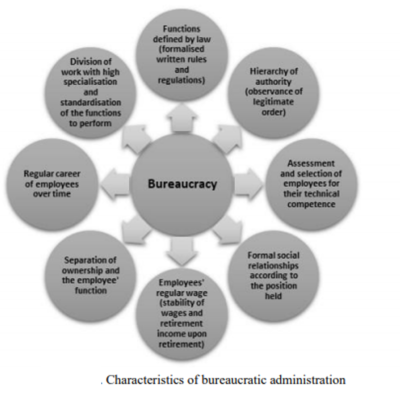Difference between revisions of "Bureaucracy"
(Created page with "'''Content Coming Soon'''") |
|||
| Line 1: | Line 1: | ||
| − | ''' | + | A '''Bureaucracy''' is specific form of [[Organization|organization]] defined by complexity, division of labor, permanence, professional management, hierarchical coordination and control, strict chain of command, and legal authority. It is distinguished from informal and collegial organizations. In its ideal form, bureaucracy is impersonal and rational and based on rules rather than ties of kinship, friendship, or patrimonial or charismatic authority. Bureaucratic organizations can be found in both public and private institutions.<ref>Defining Bureacracy [https://www.britannica.com/topic/bureaucracy Britannica]</ref> Bureaucracy in business is a [[Hierarchical Organization|hierarchical organization]] or a company that operates by a set of pre-determined rules. In a large business, there are typically several diverse functions that need to be performed by specialized sub-institutions that report up the [[Management|management]] chain. |
| + | |||
| + | The bureaucratic rationality in organizations, as the model of the organizations’ functioning in capitalist societies, has | ||
| + | the characteristics depicted in Figure the figure below.1 (Ferreira, 2004; Guzmán, 2015; Florian, 2018; Faria & Meneghetti, 2011; Ang, | ||
| + | 2016; Pollitt, 2008; Branco, 2016; Aron, 1994). | ||
| + | |||
| + | |||
| + | [[File:Bureaucracy.png|400px|Bureaucracy]]<br /> | ||
| + | source: [https://www.researchgate.net/publication/330474921_The_Concept_of_Bureaucracy_by_Max_Weber/fulltext/5c41dd96458515a4c72f75d9/The-Concept-of-Bureaucracy-by-Max-Weber.pdf International Journal of Social Science Studies] | ||
| + | |||
| + | |||
| + | '''Characteristics of Bureaucracy<ref>Characteristics of Bureaucratic Organizations [https://study.com/academy/lesson/bureaucratic-organizations-examples-lesson-quiz.html Study.com]</ref>'''<br /> | ||
| + | The basic characteristics of a bureaucracy are:<br /> | ||
| + | *Rules and job responsibilities are written down and clearly stated | ||
| + | *Clear hierarchy of power is concentrated among a few high-ranking managers | ||
| + | *Appointments and promotions of officers are formal because these officers will be held accountable | ||
| + | *Employees are hired based on their skills and knowledge, not because of favoritism or luck | ||
| + | *Salaries are tied to a pay-grade system | ||
| + | *Bureaucracies are unable or unwilling to adapt to changing conditions quickly | ||
| + | *Micro-managing is common | ||
| + | |||
| + | |||
| + | '''Bureaucracy vs. Governance or Administration<ref>Bureaucracy vs. Governance or Administration [https://www.investopedia.com/terms/b/bureaucracy.asp Investopedia]</ref>'''<br /> | ||
| + | Bureaucracy is not the same as governance or administration. Some administrative structures are not bureaucratic, and many bureaucracies are not part of administrative structures. The differences lie in the objectives of each system. | ||
| + | |||
| + | An administration directs organizational resources toward an objective goal such as generating profits or administering a service. Bureaucracies ensure procedural correctness irrespective of the circumstances or goals. | ||
| + | |||
| + | In modern industrial societies, such as the U.S., dual bureaucracies often exist between private companies and government regulatory agencies. Whenever a regulatory bureaucracy exists to impose rules on business activity, the private company might create a bureaucracy to avoid violating such regulations. | ||
Revision as of 18:32, 10 March 2021
A Bureaucracy is specific form of organization defined by complexity, division of labor, permanence, professional management, hierarchical coordination and control, strict chain of command, and legal authority. It is distinguished from informal and collegial organizations. In its ideal form, bureaucracy is impersonal and rational and based on rules rather than ties of kinship, friendship, or patrimonial or charismatic authority. Bureaucratic organizations can be found in both public and private institutions.[1] Bureaucracy in business is a hierarchical organization or a company that operates by a set of pre-determined rules. In a large business, there are typically several diverse functions that need to be performed by specialized sub-institutions that report up the management chain.
The bureaucratic rationality in organizations, as the model of the organizations’ functioning in capitalist societies, has the characteristics depicted in Figure the figure below.1 (Ferreira, 2004; Guzmán, 2015; Florian, 2018; Faria & Meneghetti, 2011; Ang, 2016; Pollitt, 2008; Branco, 2016; Aron, 1994).

source: International Journal of Social Science Studies
Characteristics of Bureaucracy[2]
The basic characteristics of a bureaucracy are:
- Rules and job responsibilities are written down and clearly stated
- Clear hierarchy of power is concentrated among a few high-ranking managers
- Appointments and promotions of officers are formal because these officers will be held accountable
- Employees are hired based on their skills and knowledge, not because of favoritism or luck
- Salaries are tied to a pay-grade system
- Bureaucracies are unable or unwilling to adapt to changing conditions quickly
- Micro-managing is common
Bureaucracy vs. Governance or Administration[3]
Bureaucracy is not the same as governance or administration. Some administrative structures are not bureaucratic, and many bureaucracies are not part of administrative structures. The differences lie in the objectives of each system.
An administration directs organizational resources toward an objective goal such as generating profits or administering a service. Bureaucracies ensure procedural correctness irrespective of the circumstances or goals.
In modern industrial societies, such as the U.S., dual bureaucracies often exist between private companies and government regulatory agencies. Whenever a regulatory bureaucracy exists to impose rules on business activity, the private company might create a bureaucracy to avoid violating such regulations.
- ↑ Defining Bureacracy Britannica
- ↑ Characteristics of Bureaucratic Organizations Study.com
- ↑ Bureaucracy vs. Governance or Administration Investopedia
